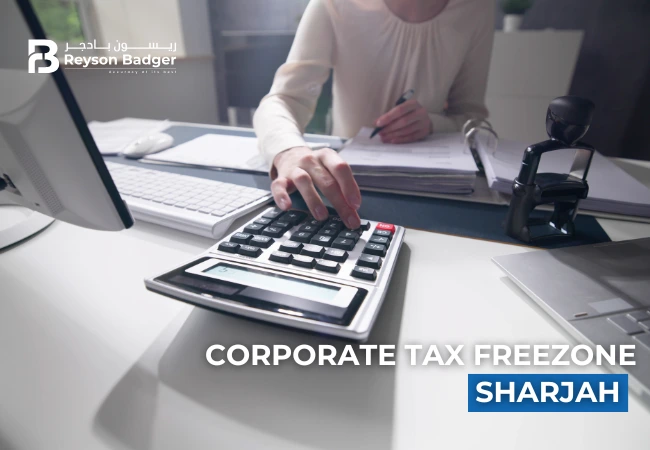
Setting up your business in a Sharjah Free Zone may feel like finding a tax haven, but even paradise has its paperwork! With the introduction of the UAE’s new corporate tax regime, businesses need to understand how the rules apply. The Corporate Tax in Sharjah Free Zone aims to support businesses, especially those with international operations. If eligible entities meet all the legal requirements, they can enjoy a 0% tax rate while non-qualifying businesses will face the standard 9% corporate tax in the UAE.
Sharjah, located in the UAE, has many free zones, distinguished by the variety of business incentives available, including no restrictions on 100% foreign ownership, no import/export duties, and no personal income tax. Free zones emphasize specific industries and boast world-class infrastructure and logistics facilities.

A free zone is a specially designated zone where companies operate with different benefits including special tax, customs, and import/export benefits. The major aim of a free zone is to attract foreign investment, boost trade, and increase the economic growth. The UAE has over 40 free zones, including Sharjah Free Zone, and each of them are specifically catered to different industries. The corporate tax in Sharjah Free Zone is different from the other free zones and is discussed in detail below.
Corporate tax in Sharjah Free Zone refers to a tax payable for the net profit earned by businesses operating within the Free Zone. However, the companies in Sharjah Free Zone benefit from tax exemptions and reduced tax rates based on their business activities and compliance with the federal tax regulations of the UAE.
There are also several free zones in Sharjah targeting different businesses and industries. Among the most prominent are:
1. Sharjah Airport International Free (SAIF) Zone
SAIF Zone is one of the major and most important free zones in Sharjah. This provides businesses access to Sharjah's international airport and has a high-standard facility. SAIF caters to industries including manufacturing, aviation, trading, and logistics.
2. Hamriyah Free Zone (HFZ)
Being on the coastal side, it is an industrial oriented area, which allows easy access to ports and infrastructure suitable for the industry, such as oil and gas, maritime, steel, and petrochemicals. Its HFZ has cheaper land leasing with logistics solutions, making it perfect for heavy industries.
3. Sharjah Publishing City (SPC)
SPC is the first free zone in the country, particularly focusing on the publishing and printing industries. To this end, it offers a full range of services to authors, publishers, and content creators by providing exclusive spaces for creativity and innovation in both cultural and creative business sectors.
4. Sharjah Media City Free Zone (SHAMS)
SHAMS focuses on media, entertainment, and digital industries, providing an environmental setup for media start-ups and entrepreneurs. It offers packages and facilities for setting up a business, content creation, production, and broadcasting on a competitive worldwide basis.
5. U.S.A. Regional Trade Center (USARTC) Free Zone
USARTC is a means of offering business trading opportunities between the U.S. and the Middle East, with it acting as a gateway to the development of relations, expansion in market penetration, and business operations in a tax-friendly environment. It offers ideal opportunities for U.S.-based companies that want to gain entry into the UAE and Middle Eastern markets.
Sharjah Free Zones boasts of several tax benefits when it comes to corporate tax. These attractive deals are geared towards bringing international and local businesses to this tax-friendly hub. Among them are the following:
1. 0% Corporate Tax Rate on Qualifying Income for Free Zone Companies
This means 0% corporate tax is applicable on eligible income for companies operating in Sharjah's free zones. This significantly applies to international trade, manufacturing, as well as other activities eligible by the UAE Government. This means that a firm can gain maximum profit by saving its overall tax burden.
2. Eligibility Criteria for the 0% Tax Rate
The companies should go through some conditions established by the UAE government, which include:
3. Differences Between Free Zone and Mainland Corporate Tax
There are several significant differences in the corporate tax regimes between Free Zones and Mainland UAE:
These advantages make Sharjah Free Zones the most attractive destination for companies interested in setting up facilities in the UAE with minimal tax liabilities while leveraging strategic access to international markets.
In the UAE corporate tax regime, free zone businesses, including those in Sharjah, can enjoy a 0% corporate tax rate on "qualifying income." However, income failing the qualifying income test is taxed at a standard corporate tax rate of 9%. Hence, it becomes crucial to distinguish between qualifying and non-qualifying income.
A Qualifying Free Zone Person is an entity incorporated in a free zone that meets the following requirements to benefit from a 0% corporate tax rate on qualifying income. To qualify an entity must meet the following:
Qualifying activities are simply certain business operations that make free zone enterprises qualified to enjoy the 0% corporate tax advantage. Generally speaking, qualifying activities involve international business, trade, or services that have no direct competition with businesses on the mainland. Here are some illustrations of qualifying activities for your reference:
Qualifying income is income generated by operations that are qualified for free zones tax exemption. This includes income:
Examples of Non-Qualifying Income Subject to 9% Corporate Tax
Non-exempt income is any income not qualifying as part of the free zone activities and therefore is subject to the regular 9% corporate tax rate. Examples are as follows:
The De Minimis Rule rule concerns free zone companies that earn a small percentage of non-qualifying income. According to this rule, free zone corporations will be exempted from taxation at 0% even when they earn some amount of non-qualifying income, provided such revenue does not exceed the set limit. The UAE government has provided such a limit at 5% of total revenue or AED 3 million, whichever is lower.
If the free zone company's non-qualifying income exceeds that threshold, then the entire income may lose its tax-exempt status meaning all its revenues will be subject to the standard 9% corporate tax rate. Therefore, the free zone companies should monitor their non-qualifying income such that it does not exceed the De Minimis limit.
Registration for corporate tax in Sharjah Free Zones is on the whole very straightforward and can take the following steps:
1. Log in to the EmaraTax Portal: Use your login credentials, such as UAE Pass, to access the EmaraTax portal. If you don't have an account, create one, or reset your password if needed.
2. Add Taxable Person: Ensure a taxable person is linked to your account. If not, create a new taxable person by providing the required details.
3. Open Corporate Tax Dashboard: Select the taxable person, and the Corporate Tax Dashboard will open.
4. Start Enrollment: Click on "Register" in the Corporate Tax section, review the instructions, and check the box to proceed.
5. Fill Entity Section: Enter all entity details based on your business type, then click "Next."
6. Fill Identification Section: Provide your trade license and business activity details, then click "Next."
7. Complete Contact Details: Enter your registered business address and click "Next" to continue.
8. Authorized Signatory Section: Upload the details of the authorized signatories, including any required attachments such as a power of attorney, if applicable.
9. Verify and Declare: Review all the information, check the declaration box, and submit your application.
10. Corporate Tax Registration Number: Once submitted, reference numbers will be generated automatically. The FTA will notify you regarding approval, rejection, or if additional information is needed.
The major obligations of Sharjah free zone entities include the following:
These duties then satisfy the conditions, and that is how one continues enjoying the benefits of the tax.
Sharjah Free Zone corporate tax non-compliance shall attract severe penalties that are categorized as:
1. Registration
Those who fail to file UAE Corporate Tax within the assigned time, will be assigned a penalty of AED 10,000.
2. Penalties and Fines
3. Loss of 0% Tax Rate
A company may lose its entitlement and entitlement to 0% corporate tax. That's all its income will be levied on a standard 9% corporate tax, as a result of not complying with the regulations, including breaking the De Minimis rule, which entails economic substance compliance.
4. Legal and Business Consequences
Non-compliance can even lead to legal action, suspension of trade licenses, or business closure by the free zone authority if the breach is repeated or habitual.
5. Interest on Unpaid Taxes
If there is non-compliance and taxes are owed, then interest will be applicable on the unpaid amount to burden an individual financially.
Maintaining compliance is therefore very important in order not to face these penalties and lose whatever tax benefits Sharjah offers.
Tax consultants such as Reyson Badger help Sharjah Freezone businesses develop an ideal tax strategy, and this is completed in the areas of tax compliance as follows:
Professional Tax Advisory ensures proper tax planning and compliance.
Navigating Corporate Tax in Sharjah Free Zones can be complex, but understanding its implications and benefits is crucial for business success. By identifying tax-deductible expenses, saving time and money, and gaining valuable insights, businesses can effectively manage their tax obligations and optimize their financial performance.
We encourage you to seek expert advice from Reyson Badger to ensure you’re maximizing your tax strategy and staying compliant with regulations.
Take the first step towards optimizing your Free Zone corporate tax today. Contact us for a consultation!
What is the purpose of corporate tax filing?
The purpose of corporate tax filing is to report a company's income, expenses, and tax obligations to the government, ensuring compliance with tax laws and regulations through accurate corporate tax filing.
What are the corporate tax services provided in the Sharjah Free Zone?
In the Sharjah Free Zone, corporate tax services include tax registration, return preparation, and filing, as well as tax planning, compliance, and advisory services, ensuring accurate and timely corporate tax services.
What are the things to consider while choosing corporate tax consultants in the Sharjah Free Zone?
When choosing corporate tax consultants in the Sharjah Free Zone, consider expertise, experience, reputation, certification, and fees. Ensure they provide tailored solutions, proactive advice, and timely support for effective corporate tax consultants.
What is the corporate minimum tax (CMT)?
The Corporate Minimum Tax is imposed on corporations based on their book income, regardless of whether they report a profit or loss for tax purposes. It aims to ensure that large, profitable corporations pay a minimum level of tax.